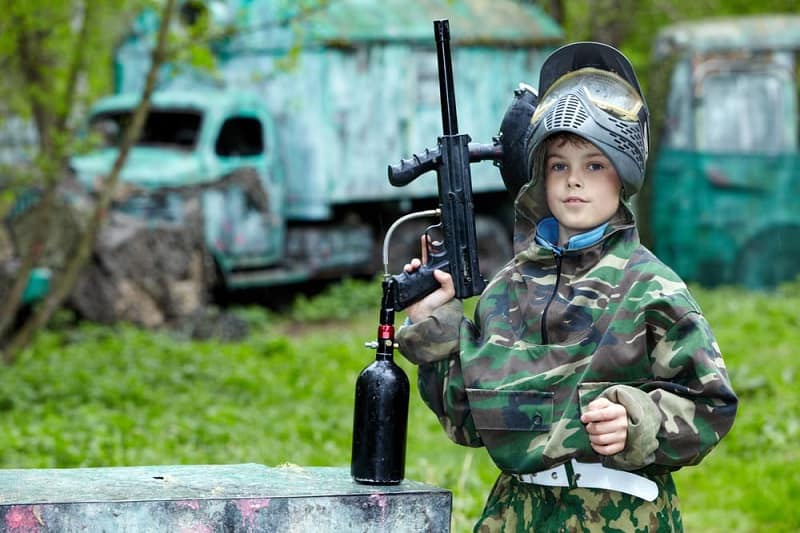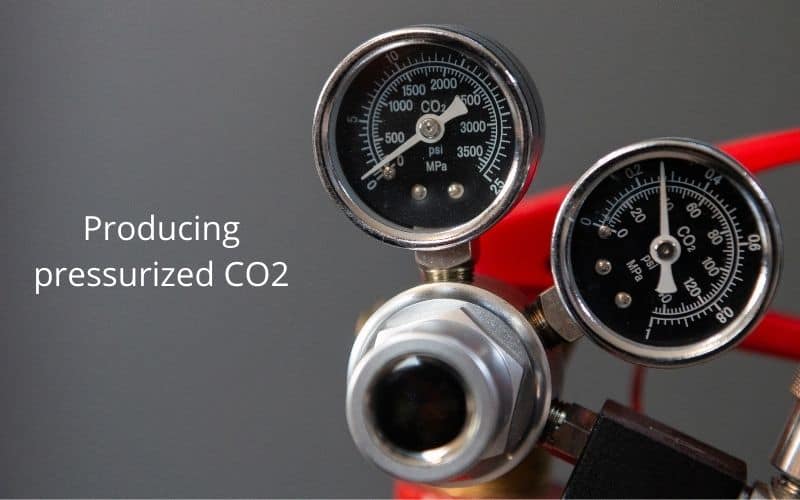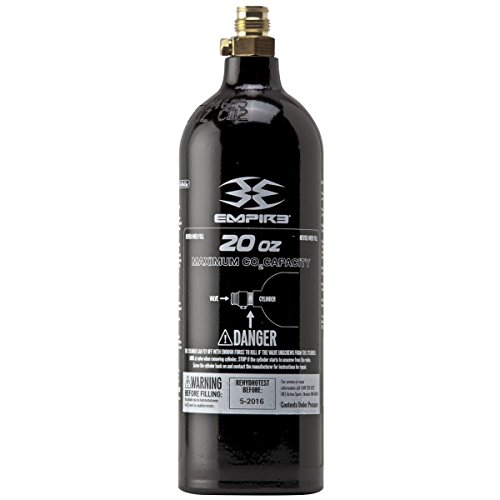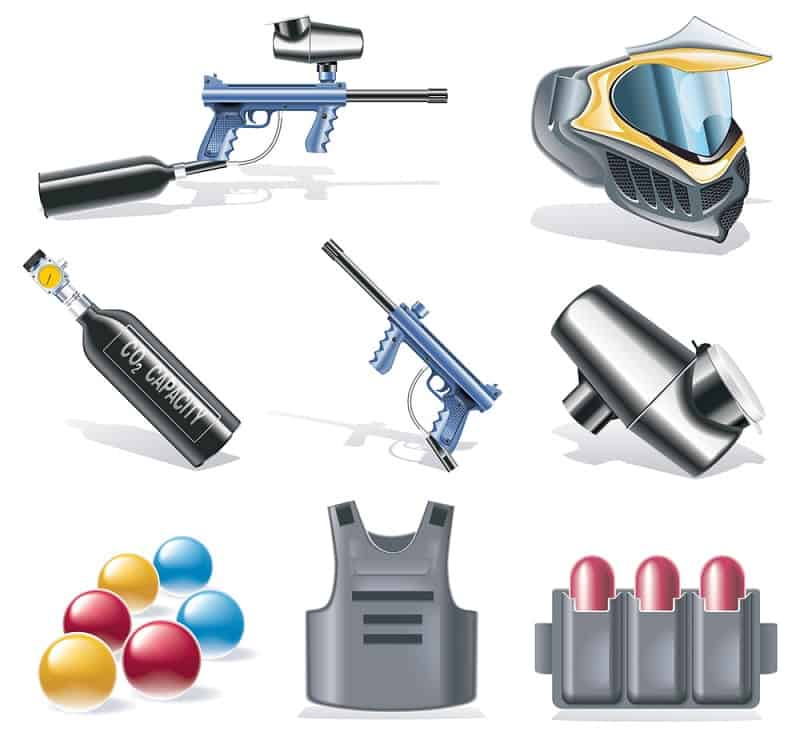CO2 gas tanks in paintballs are cheap and readily available. That’s why most beginner paintball shooters are attracted to them.
There’s just one major downside to pressurized carbon dioxide paintball guns.

Their firepower is inconsistent.
CO2 by nature has a very low temperature. It can freeze your gun while firing, which means your accuracy and shooting speed are affected. And that can damage your marker too.
All this begs the nagging question…
Contents
Why is CO2 used for paintball guns anyway?

The most obvious answer to that is it’s CHEAP.
Producing pressurized CO2 is inexpensive since companies that manufacture fire extinguishers, refrigeration systems, and even your good old soda already have the tech to do it. They just have to make the container a little bit smaller.
Aside from that, CO2 can be compacted more than other gasses. That means more pressurized CO2 is in the tanks compared to other gas propellants which translate to more fiery shots for you and your team.
And another reason is safety. Exploding CO2 gas tanks are very close to zilch. You won’t have to worry about your paintball gun blowing up right under your nose.
Does That Mean All Paintball Guns Need CO2?

CO2 tanks for paintball guns are cheap, safe, fiery, and all but that does not mean you’re stuck with it.
So, Can You Shoot a Paintball Gun without CO2?
Definitely! High-pressure air or HPA (either nitrogen gas or propane) is another option.
Choosing between CO2 and HPA would depend on the efficiency you need for your shots, safety considerations, and durability you need for your paintball gun. That’s why you’d need to take a closer look at your options. Is it going to be CO2 or HPA?
Should I Use CO2 in my Paintball Gun?

Well, that purely depends on your gaming preference. CO2 propelled paintball guns are affordable and readily available, but they have their share of downsides, too. We’ll get to that in a minute.
CO2 is a pressurized liquid inside that small tank or cartridge. When the marker is fired, the paintball enters the barrel, and liquid CO2 is discharged.
The liquid CO2 is vaporized because of the heat inside the gun. CO2 is what makes your paintballs fly off and hit the target.
That released gaseous state CO2, unlike other vapors, is cold to the touch, which then cools your gun the longer you fire it. And that results in more chances of your gun malfunctioning.
Not only that, in chilly weather, the temperature inside the CO2 tank drops as the compressed liquified CO2 starts to freeze. As a result, it affects the speed of the gas and, in turn, the paintball.
And, then if the weather gets too hot, the liquified CO2 inside builds up too much pressure. When it comes out of the tank, the speed becomes too high that your marker can cause injury to your opponent or team.
Even with these downsides, compressed liquified CO2 offers more shots per fill.
That is because it is much heavier than other gas propellants. It only means that at the same shape and size of the tank, there is more compressed CO2 jammed inside it compared to gas-filled tanks.
With all these upsides and downsides of CO2-filled paintball guns , you might think it’s not up to the task you need for your game. Then maybe you should opt to use HPA propelled markers.
Why Should I Choose HPA over CO2?

For the most part, HPA or high-pressure air offers more stable shots than CO2. It also prevents damage to your gun.
Unlike CO2, HPA is in its gaseous state while inside the tank. So, there’s not a chance of it freezing or heating up because of weather changes.
The mechanism behind HPA markers is the same as CO2 paintball guns. The only difference is HPA markers are designed with regulators and valves that help to stabilize and regulate the output pressure.
This also makes paintball gun maintenance a little easier than CO2-filled markers.
The output pressure of most HPA markers ranges from 300 psi to 1100 psi. A suitable pressure for paintball shooting.
Another advantage of HPA guns is that it does not create a bellow of cloud when fired. It does not distract or obscure your line of sight to your target.
In all these pros for using HPA instead of CO2, you may need to consider some of these cons.
HPA tanks are quite costly. Around ten times the cost of one CO2 tanks . That’s why most beginners and those that are not that seriously inclined with the sport take a step back in using it.
One other thing is that HPA powered paintball guns are quite bulky and a little difficult to carry around. That’s mainly because it has a larger tank and there are added parts like the valve and regulator.
Despite that, there might be some of you who’d like to choose HPA over CO2.
So you could make a properly informed decision, please see the comparison table below we made of CO2 and HPA.
CO2 Paintball Guns vs HPA Markers
| CO2 Propelled Paintball Guns | HPA Markers | |
| Compatibility | Incompatible with all markers | Compatible with all markers |
| Affordability | Very cheap | Can be as high as ten times or more the price of CO2 |
| Availability | Are always available in local sports goods or department stores | Can be challenging to find a refill or buy a new one. |
| Output Pressure | Inconsistent | Stable and consistent |
| Shot Frequency | Can fire more shots per fill | Fewer shots with the same size of the tank as CO2 |
| Cloud Emission | With cloud emissions after firing | Non-existent |
| Portability | Very handy | Can be quite bulky |
| Possibility Of Gun Damage | More likely, especially when shot for long periods consistently | Less likely |
Conclusion
To circle back to your first question. Yes, you can fire a paintball gun without using CO2. You have HPA to thank for that.
Your preference in choosing which propellant will be most suited for your game lies in your enthusiasm for the sport. If you enjoy it so much that you want to compete with other teams in tournaments then you better get your game up and use HPA tanks .
On the other hand, if it’s just a fleeting game of relaxation, you may be better off with CO2 tanks for your paintball gun.